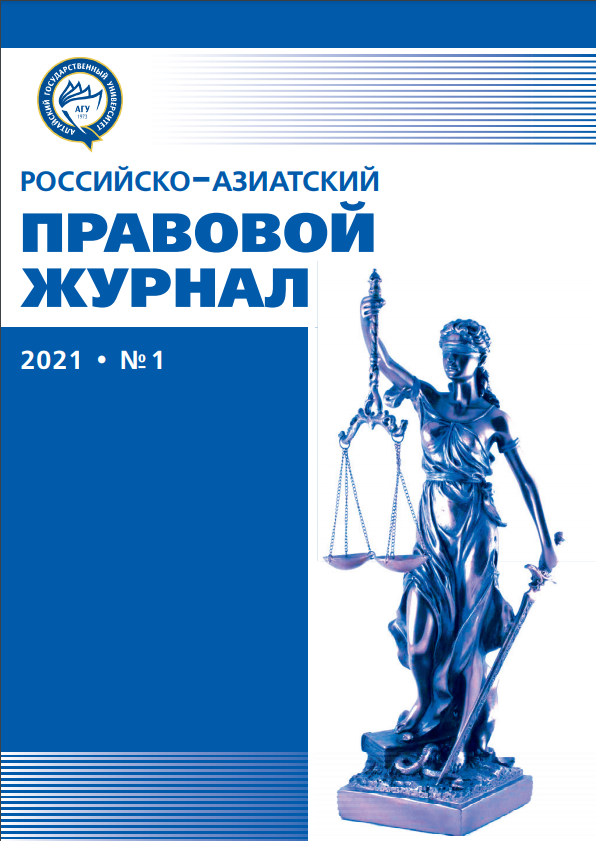“LEGACY OF GENGHIS KHAN” AS AN ASIAN FACTOR IN THE FORMATION OF THE POLITICAL AND LEGAL DOCTRINE OF EURASIANISM
УДК 32:34 ББК 66.1–21
Abstract
The article analyzes the works of representatives of classical Eurasianism. Particular attention is paidto the works of N.S. Trubetskoy, who was one of the first to define the importance of the Asian (Eastern)vector of the development of Russian statehood. The socio-economic and geopolitical substantiation ofthis vector was given by P.N. Savitsky. The manifestations of Asian influence in the idea of monarchy andits implementation in Russia were analyzed by N.N. Alekseev. Finally, G.V. Vernadsky formulated the ideaof a synthesis of Eastern Orthodoxy of Byzantium and the state organization of the Mongol Empire in thefoundation of the Russian state. The Asian factor is formed from the idea-principle, which is the unificationof the inner part of Eurasia, as well as from the mechanism for implementing this idea, based on thesystem of the structure of the great Mongol empire of Genghis Khan. In the political and legal views of the representatives of Eurasianism, this factor can be called the “Legacy of Genghis Khan”. This article is devotedto the influence of this heritage on Russian history, as well as on the formation of the doctrine of Eurasianismand its isolation among other areas of Russian thought.
Downloads
References
2. Бердяев Н.А. Евразийцы. М. : T8RUGRAM, 2018. 112 с.
3. Предчувствия и свершения (предисловие из сборника «Исход к Востоку») // Мир России — Евразия: Антология / сост.: Л.И. Новикова, И.Н. Сиземская. М. : Высш. шк., 1995. С. 23–26.
4. Борщ И.В. Николай Алексеев как философ права : монография. М. : Юрлитинформ, 2015. 168 с.
5. Алексеев Н.Н. Русский народ и государство. М. : Аграф, 2003. 640 с.
6. Трубецкой Н.С. Европа и человечество // Наследие Чингисхана. М. : Эксмо, 2019. С. 89–140.
7. Иванов А.В. Сердце пармы: роман. М. : Изд-во АСТ: Редакция Елены Шубиной, 2015. 507 с.
8. Трубецкой Н.С. Взгляд на русскую историю не с Запада, а с Востока // Наследие Чингисхана. М. : Эксмо, 2019. С. 15–88.
9. Савицкий П.Н. Континент-океан (Россия и мировой рынок) // Исход к Востоку. Философия евразийства / под ред. О.С. Широкова. М. : Добросвет, изд-во «КГУ», 2016. С. 166–193.
10. Алексеев Н.Н. Христианство и идея монархии // Русский народ и государство. М. : Аграф, 2003. С. 48–67.
11. Вернадский Г.В. Начертание русской истории. М. : Алгоритм, 2012. 336 с.
12. Почекаев Р.Ю. Правовая культура Золотой Орды (историко-правовые очерки). М. : Юрлитинформ, 2015. 312 с.
Russian-Asian Law Journal is a golden publisher, as we allow self-archiving, but most importantly we are fully transparent about your rights.
Authors may present and discuss their findings ahead of publication: at scientific conferences, on preprint servers, in public databases, and in blogs, wikis, tweets, and other informal communication channels.
Russian-Asian Law Journal allows authors to deposit manuscripts (currently under review or those for intended submission) in non-commercial, pre-print servers such as ArXiv.
Authors who publish with this journal agree to the following terms:
- Authors retain copyright and grant the journal right of first publication with the work simultaneously licensed under a Creative Commons Attribution License that allows others to share the work with an acknowledgement of the work's authorship and initial publication in this journal.
- Authors are able to enter into separate, additional contractual arrangements for the non-exclusive distribution of the journal's published version of the work (e.g., post it to an institutional repository or publish it in a book), with an acknowledgement of its initial publication in this journal.
- Authors are permitted and encouraged to post their work online (e.g., in institutional repositories or on their website) prior to and during the submission process, as it can lead to productive exchanges, as well as earlier and greater citation of published work (See The Effect of Open Access).








